Migrants and benefits: let's call the whole thing off?
In a speech at University Campus Suffolk in Ipswich this afternoon, David Cameron outlined the government's new immigration strategy, which is to be rolled out in time for 2014, when migrants from Bulgaria and Romania will gain full rights to work in the UK.
The driving force behind the speech and the new initiatives is concern over the impact of benefit and health tourism, with a number of migrants moving to the country supposedly to gain access to the UK's welfare system. Recently, we looked into reports that Bulgarians and Romanians would be up to nine times better off if they moved to Britain compared to remaining in their own country.
The Government wants to remove the economic incentives for migrants planning a move to the UK by introducing transitional controls for migrants coming from countries like Romania and Bulgaria. It's also been argued that this will help the Conservative-led Coalition to stem UKIP's surge in the polls.
So what are the key points? For starters, EEA (European Economic Area) migrants will see their Job Seeker's Allowance cut after 6 months, unless claimants "can prove that they're not just genuinely seeking employment", but also that they have "a genuine chance of getting a job".
In order to be eligible for social housing migrants will also be subject to a residential test to prove that they've been in the country for at least two years.
Over the weekend Immigration Minister Mark Harper appeared on both the BBC's Sunday Politics show and on Murnaghan's show on Sky News. Below we've looked at some of the crucial ideas behind the policy and we'll assess whether they're based on sound data.
"Only about a third of migrants that come to Britain are actually from the EU at all, most migrants are from outside the EU." Immigration Minister Mark Harper on the Sunday Politics, March 24 2013
The ONS revealed last month that total long-term immigration to the UK was 515,000 in the year to June 2012, down from 589,000 in the year to June 2011. According to the ONS, an estimated 157,000 of these were EU citizens in the year to June 2012, that is 30% of all immigrants, roughly the "third of migrants" claimed by Mr Harper.
The ONS also goes into more detail: "from within the EU, 157,000 EU citizens (excluding British) migrated to the UK in the year ending June 2012, similar to the estimate of 175,000 the previous year. Of these citizens, 62,000 were citizens of the countries that joined the EU in May 2004: Czech Republic, Estonia, Hungary, Latvia, Lithuania, Poland, Slovakia and Slovenia, known collectively as the EU8 or A8."
"Our public finances would be in a much less good state if we didn't have migration. [...] The OBR which is the government's own body which has looked into this issue, say public debt would be in a very bad way if we didn't have the level of migration that we have." Barbara Roche MP, Radio 4 Today Programme, March 25 2013
In July 2012 the Office for Budget Responsibility unveiled its Fiscal Responsibility Report. In the report the OBR envisions different scenarios for economic growth, drawing a direct link between higher immigration and stronger growth.
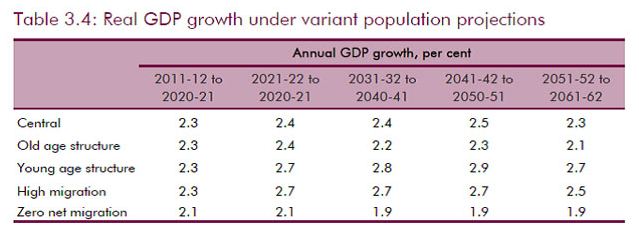
The link extends to public debt. According to the OBR, higher immigration means a larger working population, given that immigrants are generally younger. This would mean that in 2062 the national debt would be 50% rather than 90% of GDP.
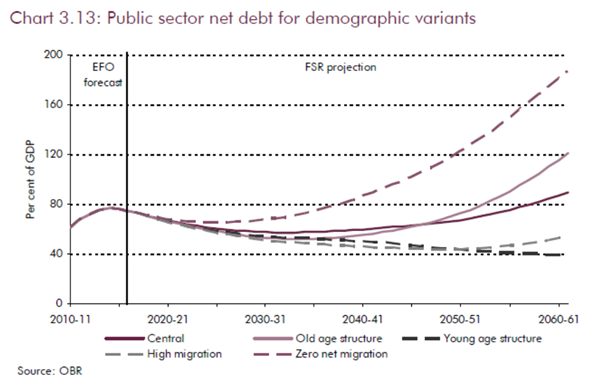
However, this report was criticised by organisations such as Migration Watch which pointed out that "any effect is temporary as the calculation depends on an assumption that immigrants are younger than the general population but, amazingly, they also grow old."
"I don't want to speculate on what that number might be, but the number we have heard is not £20m, it's £200m. I think it's significantly more than that ... It's a huge issue and I don't think those numbers [the £20m figure] are at all accurate." Jeremy Hunt, BBC The World At One, March 25 2013
One of the policies - aimed at curbing so-called health tourism - will see non-EU migrants being charged to use the NHS. But how much does health tourism cost the country? According to Jeremy Hunt, it's around £200 million, although he did express doubt over the origins of the figure.
We looked into this two years ago when the exact same figure was cited by Richard Littlejohn in the Daily Mail. We found research published by the House of Commons which revealed that the use of the NHS by foreign nationals had cost the public purse just shy of £7 million in 2009-10.
However in 2003 debt collection agency CCI Legal Services, which works with the NHS to recover payments owed, estimated that the costs could be anywhere between £50 million and £200 million. At the time of our factcheck, we got in touch with CCI and were told that the firm no longer held copies of the 2003 research.
A spokesperson told us that while they thought the likely costs incurred by overseas patients were still "significant", they were likely to have fallen since the 2003 estimate was made as there had been "greater awareness of the issue and greater effort to tackle it."
Appearing later this evening at a House of Commons debate, Jeremy Hunt admitted "we don't know the full extent of abuse of NHS resources."
"Of the roughly 1.8 million people from elsewhere in the EU of working age, about 5% are claiming out-of-work benefits." Radio 4 Today Programme, March 25 2013
The most recent DWP statistics on foreign nationals claiming benefits was published over a year ago using data from February 2011. The report found that as of February 2011, over 5 and a half million people were claiming DWP working-age benefits. Of these 371,000 (6.4%) were estimated to have been non-UK nationals.
Overall 16.6% of working age UK nationals were claiming a DWP working age benefit compared to 6.6% of working age non-UK nationals. So, based on data from National Insurance numbers, UK nationals are around two-and-a-half times as likely to be claiming working age benefits than non-UK nationals.
Last year, Full Fact looked into whether migrants were less likely than UK nationals to claim working age benefits. The table below shows our findings:
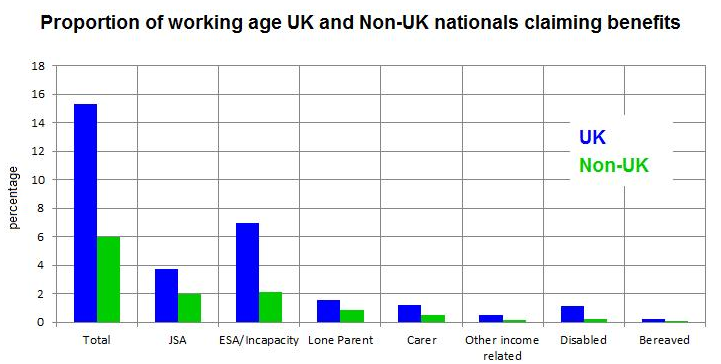
[Updated]: "The number of council flats and houses going to foreign nationals has been rising steadily, from 6.5% in 2007/8 to almost one in ten today." The Sunday Times, March 24 2013
A press release published yesterday by the Department for Communities and Local Government (DCLG) points to the sources of these claims. One is a Commons debate in which it was reported that "across England in 2010/11, 9% of those new to social tenancy are not UK nationals."
However the ultimate source for the figures is the DCLG's Continuous Record of Lettings dataset. As we can see from the table below, in 2007/8 it was found that the proportion of new social lets to foreign nationals was 6.5% (with 1.1% going to members of EU8 countries, 1.8% to EEA nationals, and the remaining 3.8% to non-EU residents).

In 2011 to 2012 the figure rose to 8.6% across England.

The proportion of lettings going to foreign nationals has therefore increased, although on this evidence, not quite to the point where one in ten social lettings goes to a migrant.
It is also important to bear in mind here that the proportion of the population as a whole who are foreign nationals has also increased over the same period, from 6.8% in 2007 to 7.9% in 2011, according to the Labour Force Survey.
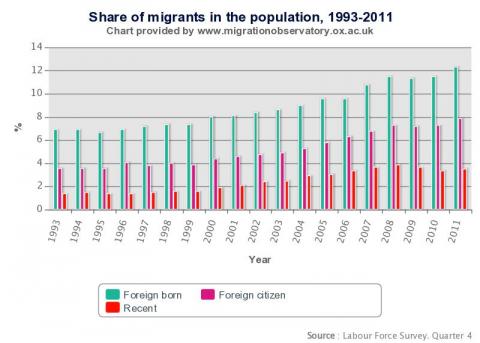
"Of the 2 million net migrants to the UK from the eight eastern European countries that joined the EU in 2004, just 13,000 people have claimed jobseeker's allowance (JSA). This figure was not disputed by No 10." The Guardian, March 26 2013
This claim chimes with statistics published by the DWP and reported in the table below. It's important to clarify, however, that the 13,000 figure - a snapshot from February 2011 - is compared against 2.2 milion net migrants arriving in the UK between 1997 and 2009 (Source: UKBA), and not against the combined number of net migrants from the EU8 countries.
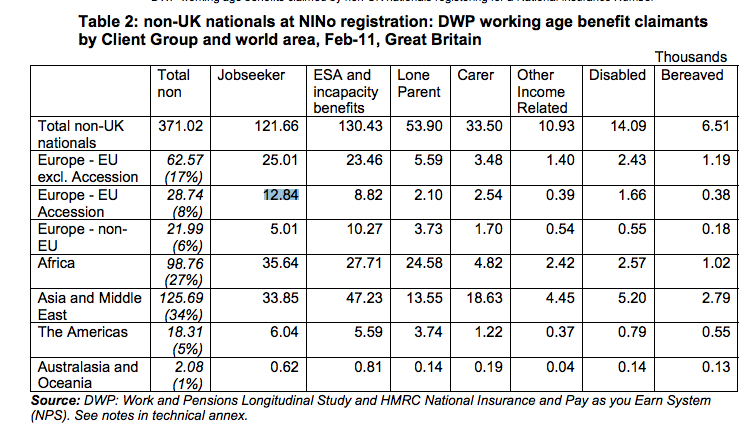
---
Image courtesy of bisgovuk